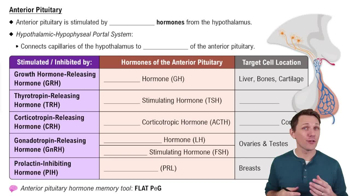More than one choice may apply.
Which of the following is given as a drug to reduce inflammation?
a. Epinephrine
b. Cortisol
c. Aldosterone
d. ADH
 Verified step by step guidance
Verified step by step guidance Verified video answer for a similar problem:
Verified video answer for a similar problem:



 13:6m
13:6mMaster Review of Major Hormones with a bite sized video explanation from Bruce Bryan
Start learning